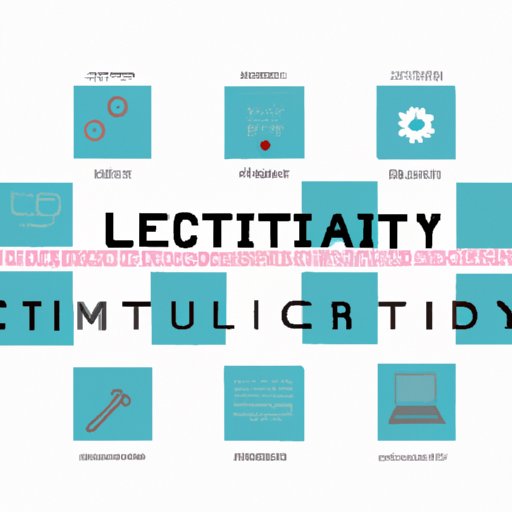Introduction
As technology continues to evolve, it is becoming increasingly important for individuals to be aware of the tools and skills needed to use it effectively. Technology literacy is the ability to understand and use technology, including hardware, software, networks, and the Internet. It is the foundation for a range of digital skills that are necessary to navigate the digital world confidently and safely. This article will explore what technology literacy is, why it matters, how to develop technology literacy skills, and the impact of technology literacy on education and employment.
Defining Technology Literacy: What It Is and Why It Matters
Technology literacy is defined as “the ability to use technology to access, analyze, evaluate, create, and communicate information” (ISTE Standards for Students). It involves understanding the various components of technology, such as hardware, software, networks, and the Internet, and being able to use them effectively. Technology literacy also includes the ability to use digital tools to communicate, collaborate, and solve problems. Furthermore, technology literacy requires an understanding of ethical and legal issues related to technology use.
Technology literacy is essential in today’s digital world. According to the CDC, having technology literacy allows individuals to access and use digital tools to find, analyze, evaluate, and share information. It also enables individuals to interact with peers and experts, and participate in online communities. Additionally, technology literacy can help individuals become better informed consumers, protect their privacy and security, and make responsible decisions.

How to Develop Technology Literacy Skills
Developing technology literacy skills is important for both students and adults. There are several ways to improve one’s technology literacy skills. The first step is to become familiar with the different types of technology literacy. These include basic computer skills, digital communication skills, online research skills, digital media literacy, coding, and problem-solving skills.
Once you have identified the type of technology literacy you would like to develop, there are several strategies for improving your skills. One way is to take advantage of free online resources, such as tutorials or webinars. You can also join online communities where you can ask questions and get feedback from other users. Additionally, attending workshops and courses can help you gain a better understanding of the technology you are using.

The Impact of Technology Literacy on Education and Employment
Technology literacy has a major impact on both education and employment. In terms of education, technology literacy is essential for students to succeed in school. According to a study by the Educational Testing Service, technology literacy is a key factor for college and career readiness. The study found that technology literacy helps students to better understand and interpret information, solve complex problems, and collaborate with others.
In terms of employment, technology literacy is becoming increasingly important in the workplace. A study by the IT Pro found that digital skills are highly sought after by employers. The study found that having digital skills can give job seekers an edge when applying for jobs, as well as help them stay ahead of their competition. Additionally, technology literacy can help employees stay up-to-date with the latest technologies and trends, which can be beneficial in their roles.
Understanding Technology Literacy in the Workplace
Implementing technology literacy in the workplace can bring many benefits. Having technology literacy can help employees to be more productive and efficient in their jobs. It can also help organizations to save time and money, as well as increase customer satisfaction. Additionally, technology literacy can help employees to stay up-to-date with changes in the industry and remain competitive.
However, implementing technology literacy in the workplace can also present challenges. For example, organizations must ensure that employees have access to the appropriate technology and training. Additionally, organizations must create policies and procedures to ensure that employees are using technology responsibly. Finally, organizations must provide ongoing support and guidance to ensure that employees are using technology effectively.

Examining the Role of Technology Literacy in Modern Society
Technology literacy plays an important role in modern society. It is essential for individuals to be able to use technology responsibly and ethically. This includes understanding digital citizenship, which involves understanding and respecting the rights of others online, as well as protecting one’s own privacy and security.
Technology literacy also has an impact on society as a whole. Technology literacy can help bridge the digital divide, as it enables individuals to access and use technology regardless of their social or economic status. Additionally, technology literacy can help reduce cybercrime, as it helps individuals to recognize potential threats and protect themselves online.
Conclusion
Technology literacy is becoming increasingly important in modern society. This article has explored the definition of technology literacy, its benefits, strategies for improving technology literacy, its impact on education and employment, and its role in society. Technology literacy is essential for individuals to be able to use technology responsibly and ethically, as well as to stay up-to-date with the latest technologies and trends. Furthermore, technology literacy can help bridge the digital divide and reduce cybercrime. Ultimately, technology literacy is an important skill that everyone should strive to develop.
(Note: Is this article not meeting your expectations? Do you have knowledge or insights to share? Unlock new opportunities and expand your reach by joining our authors team. Click Registration to join us and share your expertise with our readers.)
